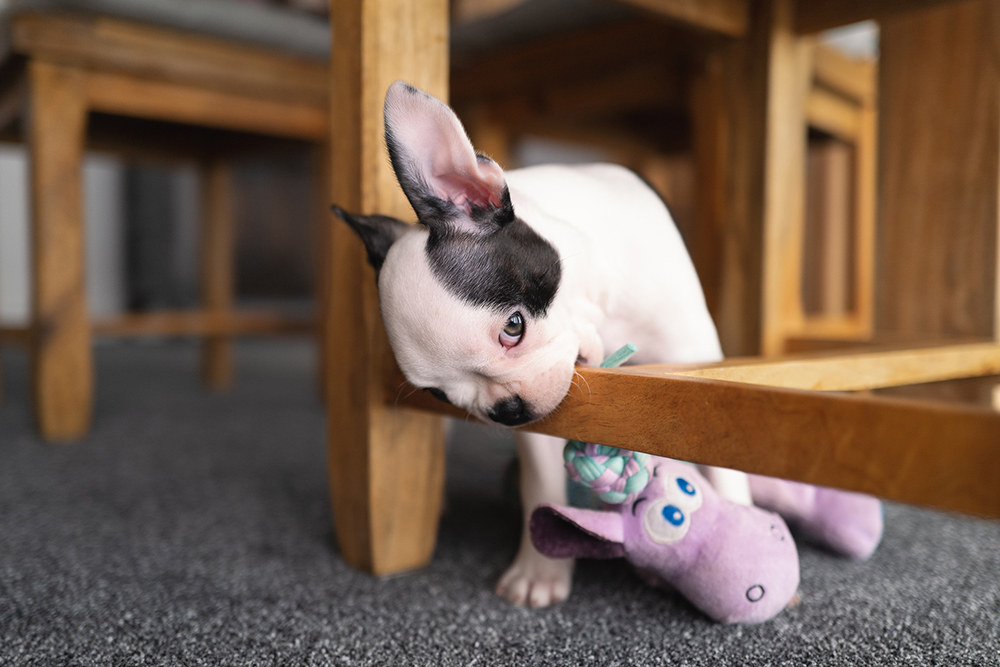The joys of bringing home a new puppy in Granger, IN, are immense. However, along with this joy comes certain responsibilities, one of which is understanding and navigating the puppy teething process. At Kryder + Harr Veterinary Clinic, we are here to guide you through every step.

The Puppy Teething Timeline in Detail
Newborn puppies (up to three weeks old) don’t have teeth. The teething process begins between the third and seventh week, with 28 baby teeth gradually appearing. The process is typically complete by the eighth week. However, just as your puppy begins settling into their new environment, another round of teething begins – the adult teeth start to emerge.
This transition to adult teeth, also known as permanent teeth, usually starts around three to four months of age. By the time your puppy is six to seven months old, they should have all 42 of their adult teeth.
Signs Your Puppy is Teething
Puppy teething is often accompanied by certain telltale signs. These may include excessive chewing on toys, furniture, or your shoes. You might also notice drooling, changes in eating habits, or swollen gums. Some puppies may show signs of discomfort or irritability.
What You Can Do to Help Your Teething Puppy
Offer your puppy plenty of suitable chew toys to soothe their gums and keep them from damaging your belongings. Frozen carrots or special puppy teething toys can be excellent choices. You can also encourage your puppy to chew on their own toys rather than inappropriate objects by reinforcing positive behavior.
Maintaining your puppy’s oral health during this time is crucial. Regularly check their mouth for signs of infection or any other abnormalities. Brushing your puppy’s teeth daily with a pet-safe toothpaste is also beneficial.
Potential Complications and When to Seek Veterinary Help
Complications During the Puppy Teething Process
While most puppies go through the teething process without any significant issues, complications can occur. Sometimes, a puppy’s baby teeth don’t fall out as the adult teeth come in, a condition known as retained deciduous teeth. This condition can lead to problems such as gum irritation, bad breath, and misaligned teeth.
When to Contact Kryder & Harr Veterinary Clinic
If your puppy appears to be in severe pain, isn’t eating, or you notice a retained baby tooth, it’s time to reach out to your trusted veterinary team in Granger, IN. At Kryder & Harr Veterinary Clinic, we are equipped to manage any teething-related problems your puppy may have.
Understanding the teething process can help you ensure that your puppy transitions smoothly into adulthood. If you need more advice or think your puppy is experiencing teething complications, we invite you to call us at (574) 277-6533 to schedule an appointment.
Remember, the journey of puppyhood is a special one. With a little knowledge, patience, and the right veterinary partner, you can navigate this phase effectively, ensuring a happier, healthier life for your furry friend. At Kryder & Harr Veterinary Clinic, we’re not just your pet’s healthcare provider; we’re part of your pet family too.
In future blogs, we will dive deeper into other important aspects of pet care, from nutrition to training, vaccinations, and more. Stay tuned to our blog to keep your pet knowledge up-to-date and keep your furry friends in peak health.
Recent Posts
About Us
Welcome to Kryder & Harr Veterinary Clinic! Our animal hospital has been a fixture in the Granger community since 1981, practicing full-service veterinary medicine for all our pet parents and their furry family members. At KHVC, we pride ourselves on our history, of providing excellent customer service for our clients, along with dedicated, compassionate, and exceptional medical care for all of our patients.
